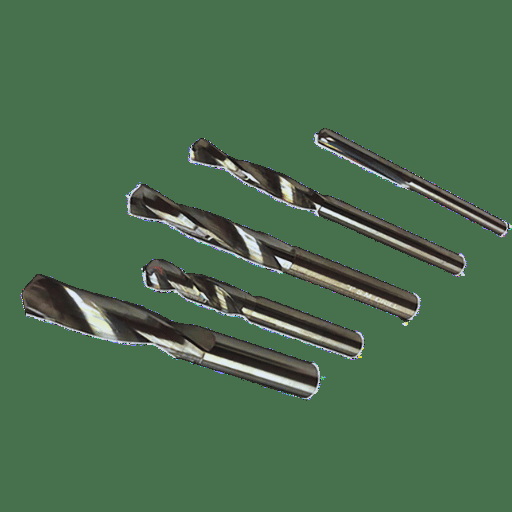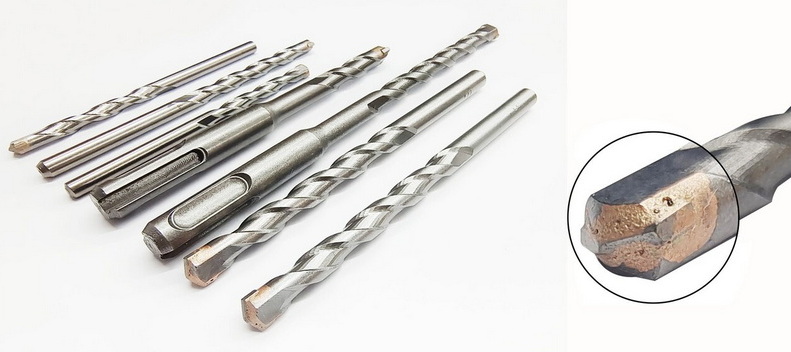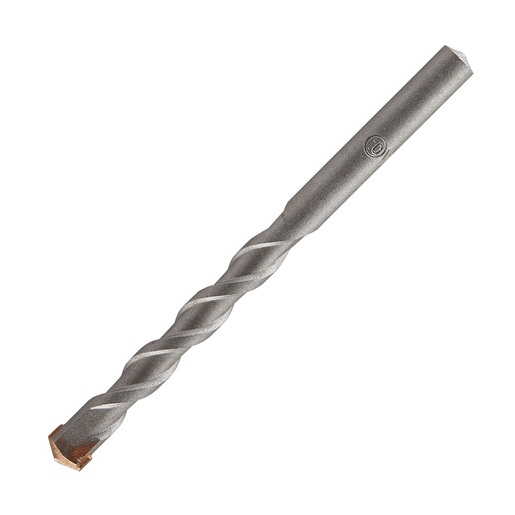Content Menu
● Understanding Tungsten Carbide
>> Properties of Tungsten Carbide
● Applications of Tungsten Carbide Drill Bits
>> Manufacturing Industry
>> Construction and Masonry
>> Oil and Gas Industry
>> Automotive Industry
>> Woodworking
● Benefits of Using Tungsten Carbide Drill Bits
● Types of Tungsten Carbide Drill Bits
● How to Choose the Right Tungsten Carbide Drill Bit
>> Understanding Bit Sizes
● Maintenance Tips for Tungsten Carbide Drill Bits
● Common Mistakes When Using Tungsten Carbide Drill Bits
>> Using Incorrect Speed Settings
>> Not Using Lubrication
>> Ignoring Bit Wear
● Conclusion
● FAQ
>> 1. What materials can tungsten carbide drill bits be used on?
>> 2. Are tungsten carbide drill bits worth the investment?
>> 3. How do I maintain my tungsten carbide drill bits?
>> 4. Can I use tungsten carbide drill bits for woodworking?
>> 5. What is the difference between twist drill bits and masonry bits?
● Citations:
Tungsten carbide drill bits are essential tools in various industries due to their exceptional hardness, durability, and precision. These bits are designed to cut through a wide range of materials, making them invaluable in applications requiring high performance and reliability. This article explores the uses, benefits, and applications of tungsten carbide drill bits across different sectors.

Understanding Tungsten Carbide
Tungsten carbide is a chemical compound made from tungsten and carbon. It is known for its hardness, ranking between 8.5 and 9 on Moh's hardness scale, just below diamond. This exceptional hardness makes tungsten carbide an ideal material for drill bits, allowing them to maintain sharpness and perform effectively even under extreme conditions.
Properties of Tungsten Carbide
The unique properties of tungsten carbide contribute to its widespread use in manufacturing drill bits:
- High Density: Tungsten carbide is denser than steel, which helps in achieving better penetration during drilling.
- Wear Resistance: Its resistance to wear makes it suitable for high-volume drilling operations.
- Toughness: Tungsten carbide can withstand impact and shock, reducing the risk of breakage during heavy-duty applications.
Applications of Tungsten Carbide Drill Bits
Tungsten carbide drill bits are used in a variety of applications across multiple industries:
Manufacturing Industry
In the manufacturing sector, tungsten carbide drill bits are crucial for drilling precise holes in materials such as steel, aluminum, and other metals. They are particularly valuable in high-precision tasks like drilling printed circuit boards (PCBs), where exact hole diameters are critical.
- Aerospace Components: Drilling lightweight but strong materials used in aircraft manufacturing.
- Electronics: Creating precise holes for wiring and components in electronic devices.
Construction and Masonry
These drill bits excel in construction and masonry applications, efficiently penetrating tough materials like concrete and brick. Their durability allows them to handle the abrasive nature of these materials, making them ideal for tasks such as installing fixtures and anchors.
- Concrete Drilling: Used for installing rebar or electrical conduits.
- Brickwork: Creating holes for wall anchors or plumbing installations.
Oil and Gas Industry
In the oil and gas sector, tungsten carbide drill bits are indispensable for drilling operations. Roller cone bits with tungsten carbide inserts can penetrate tough geological formations while withstanding immense pressure and abrasion. This capability reduces the frequency of bit changes, increasing operational efficiency.
- Exploratory Drilling: Used in locating oil reserves by drilling through various rock layers.
- Production Wells: Essential for creating wells that extract oil or gas from underground reservoirs.
Automotive Industry
The automotive industry utilizes tungsten carbide drill bits for drilling precise holes in metal components during manufacturing processes. Their ability to maintain sharpness under high-speed operations enhances productivity and ensures high-quality assembly.
- Engine Components: Drilling holes for fuel injectors or mounting brackets.
- Chassis Parts: Creating precise holes for assembly and fastening.
Woodworking
Although not as common in woodworking compared to other materials, tungsten carbide drill bits can be used for tasks requiring extreme precision in dense hardwoods. They provide clean and accurate holes, making them suitable for repetitive drilling projects.
- Cabinetmaking: Drilling holes for hinges or drawer slides.
- Furniture Assembly: Creating precise dowel holes for strong joints.

Benefits of Using Tungsten Carbide Drill Bits
The use of tungsten carbide drill bits offers several advantages:
- Durability: Tungsten carbide bits are highly resistant to wear and tear, maintaining their cutting edge longer than other materials.
- Precision: These bits provide accurate drilling results, essential for high-quality production.
- Heat Resistance: Tungsten carbide can withstand high temperatures generated during drilling operations without losing its effectiveness.
- Cost-Effectiveness: While the initial investment may be higher, the long lifespan of tungsten carbide drill bits leads to significant cost savings over time due to reduced replacements and maintenance.
Types of Tungsten Carbide Drill Bits
Tungsten carbide drill bits come in various types designed for specific applications:
| Type | Description |
| Twist Drill Bits | Commonly used for general-purpose drilling in metals and plastics. |
| Masonry Bits | Designed specifically for drilling into hard materials like concrete and brick. |
| Spade Bits | Used for larger holes in wood or soft materials. |
| Forstner Bits | Ideal for clean flat-bottomed holes in wood. |
| Step Bits | Used for creating holes of varying diameters in thin materials like sheet metal. |
How to Choose the Right Tungsten Carbide Drill Bit
When selecting a tungsten carbide drill bit, consider the following factors:
- Material Type: Ensure the bit is suitable for the material you intend to drill.
- Bit Size: Choose the appropriate size based on your project requirements.
- Bit Type: Select a bit type that matches your specific application needs (e.g., masonry vs. metal).
- Drilling Speed: Consider the recommended speeds for different materials to avoid overheating the bit.
Understanding Bit Sizes
Tungsten carbide drill bits come in various sizes measured by diameter (in inches or millimeters). It's important to select the correct size based on your project requirements:
- Smaller bits (1/16" - 1/8") are ideal for precision work like electronics.
- Medium-sized bits (1/4" - 1/2") are versatile for general-purpose drilling.
- Larger bits (over 1/2") are suited for heavy-duty applications like construction.
Maintenance Tips for Tungsten Carbide Drill Bits
To extend the life of your tungsten carbide drill bits:
- Keep Them Clean: Regularly clean the bits to remove debris that can affect performance.
- Use Proper Speed Settings: Avoid excessive speeds that can lead to overheating.
- Store Properly: Store bits in a dry place to prevent corrosion.
Common Mistakes When Using Tungsten Carbide Drill Bits
Even experienced users can make mistakes when using tungsten carbide drill bits that can lead to decreased performance or damage:
Using Incorrect Speed Settings
Using too high or too low speed can cause overheating or ineffective cutting:
- High speeds can lead to overheating and dulling of the bit.
- Low speeds may cause binding or excessive pressure on the bit.
Not Using Lubrication
For metal drilling, not using lubrication can lead to increased friction and heat:
- Use cutting oil or coolant when drilling metals to enhance performance and prolong bit life.
Ignoring Bit Wear
Continuously using worn-out bits can compromise accuracy:
- Regularly inspect your drill bits; replace them when they show signs of wear such as chipping or dullness.
Conclusion
Tungsten carbide drill bits are versatile tools that play a vital role in various industries due to their hardness, durability, and precision. They are essential for tasks ranging from manufacturing to construction and oil drilling. By understanding their applications and benefits, users can make informed decisions about their use, leading to improved efficiency and cost savings.

FAQ
1. What materials can tungsten carbide drill bits be used on?
Tungsten carbide drill bits can cut through work-hardened metals, non-ferrous materials like brass and aluminum, concrete, masonry, hardwoods, glass, stone, and ceramic tile.
2. Are tungsten carbide drill bits worth the investment?
Yes, despite their higher initial cost, they offer significant long-term savings due to their extended lifespan and reduced need for replacements.
3. How do I maintain my tungsten carbide drill bits?
Keep them clean from debris, use appropriate speed settings during drilling, and store them properly to prevent corrosion.
4. Can I use tungsten carbide drill bits for woodworking?
Yes, they can be used for woodworking tasks requiring precision when drilling dense hardwoods.
5. What is the difference between twist drill bits and masonry bits?
Twist drill bits are general-purpose tools suitable for metals and plastics, while masonry bits are specifically designed to penetrate hard materials like concrete.
Citations:
[1] https://shop.machinemfg.com/tungsten-carbide-drill-bits-benefits-and-applications/
[2] https://huanatools.com/wp-content/uploads/2023/07/HPX-Angled-Set.jpg.webp?sa=X&ved=2ahUKEwjfm8WyuqWLAxUVILkGHfcKODYQ_B16BAgGEAI
[3] https://www.rubi.com/us/product/tungsten-carbide-drill-bits
[4] https://www.carbide-usa.com/the-benefits-of-tungsten-carbide-drill-bits/
[5] https://www.tungstenman.com/tungsten-carbide-tools/oil-gas-drill-bits.html
[6] https://www.drillbitwarehouse.com/what-materials-can-you-use-carbide-drill-bits-on/
[7] https://www.reddit.com/r/Tools/comments/1d6odcj/what_is_each_drill_bit_tip_used_for/
[8] https://www.repurvis.com/articles/tungsten-carbide-bits-explained
[9] https://www.tungco.com/insights/blog/tungsten-drill-bits-benefits-uses/
[10] https://www.midlandtool.com/blog/1184/carbide-drill-bits-everything-you-need-to-know
















